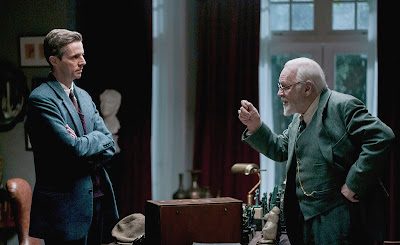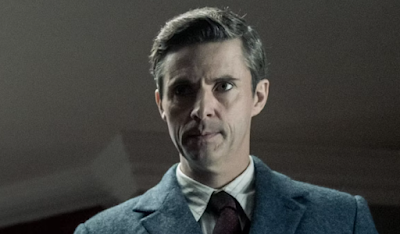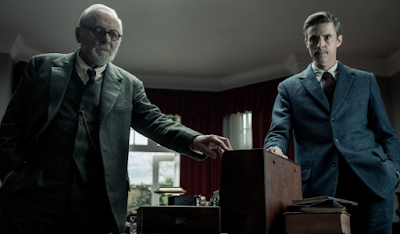A young woman named Sam finds herself trapped in New York City during the early stages of an invasion by alien creatures with ultra-sensitive hearing.
Directed by Michael Sarnoski and co-written with John Krasinski and Bryan Woods, A Quiet Place: Day One brings a fresh perspective to the familiar world of sound-sensitive alien invaders. This prequel and spin-off, diverging from the Abbott family narrative, explores the early days of the extraterrestrial invasion through the experiences of a new set of characters in New York City, notably within the culturally rich areas of Chinatown and Harlem.
The film opens up the universe of A Quiet Place by presenting a broader geographical and emotional landscape. While the original films primarily focused on the Abbott family's struggle in a rural setting, this instalment offers a vivid urban backdrop. However, Day One takes a different narrative approach by centring on Samira (Lupita Nyong'o), a terminally ill woman. Her journey is not about survival in the traditional sense but rather about navigating the apocalyptic chaos on her own terms, seeking a poignant last connection to a place and experience she holds dear.
One of the most striking elements of Day One is its use of sound—or the absence thereof. The extensive stretches of silence heighten the tension, making every small noise a potential harbinger of doom. This clever use of sound design immerses the audience in a world where the slightest sound can be deadly, a hallmark of the series that continues to be effectively utilized. The silence serves as a powerful narrative tool, underscoring the fragility of life in this transformed world.
Despite its strengths, the film struggles with certain narrative choices. Samira's character arc, centred on her terminal illness and a final quest for a slice of pizza from her favourite Harlem spot, feels both absurd and oddly endearing. The journey she undertakes, alongside strangers, becomes a contemplation of death and acceptance rather than a straightforward survival story. This shift in focus might not satisfy fans looking for a deeper exploration of the Quiet Place mythology. The film does not expand significantly on the lore of the alien creatures or the universe, leaving some viewers craving more context and background.
The character of Samira is compelling, yet the film's pacing and structure hinder deeper emotional investment. Lupita Nyong'o delivers a nuanced performance, conveying a range of emotions through subtle expressions and body language, often without the need for dialogue. However, the script does not delve deeply into her backstory, leaving her character somewhat empty. This lack of character development is a notable flaw, as it prevents the audience from fully connecting with her plight and the supporting characters.
In contrast, the film finds a unique and unexpected source of charm and tension in Frodo, Samira's "support cat." This unusually calm and loyal feline provides moments of levity and serves as a silent, steady presence throughout the chaos. Frodo's uncanny ability to stay silent and composed, even in the face of danger, adds an interesting layer to the narrative, offering a counterpoint to the ever-present threat of the aliens.
Day One's strengths lie in its atmospheric tension and visual storytelling. The first half of the film is particularly strong, blending elements of horror, suspense, and dark humour. The visuals are striking, with the chaos of a city under siege providing a dramatic backdrop for the characters' desperate struggle. The use of New York City's diverse neighbourhoods adds a rich texture to the setting, contrasting the stark silence with the cultural vibrancy of the locations.
However, as the film progresses, it loses some of its initial momentum. The second half lacks the same intensity and the pacing is occasionally bogged down by unnecessary plot points and implausible scenarios. These narrative detours detract from the central themes of isolation and the human need for connection, making some sequences feel contrived or distracting.
Ultimately, A Quiet Place: Day One is a mixed bag. It offers a fresh take on the franchise's concept, focusing more on human emotions and existential themes rather than expanding the lore of the alien threat. The decision to frame the story around a terminally ill protagonist grappling with the end of her life amidst a cataclysmic event is both bold and limiting. While this approach provides a new lens through which to view the familiar premise, it may leave fans of the original films feeling unfulfilled due to the lack of new revelations about the alien invaders or the broader universe.
A Quiet Place: Day One succeeds in delivering a suspenseful, atmospheric experience, elevated by Lupita Nyong'o's strong performance and the film's masterful sound design. However, it falls short in character development and narrative depth, leaving audiences with a sense of missed opportunities. The film stands as a unique addition to the franchise, offering a thought-provoking exploration of human resilience and the desire for meaningful experiences in the face of impending doom. Yet, it also highlights the challenge of balancing fresh storytelling with the expectations of a well-established cinematic universe.
A Quiet Place: Day One was released in NZ cinemas on June 27, 2024


































%20Filming%20Locations8.jpg)







